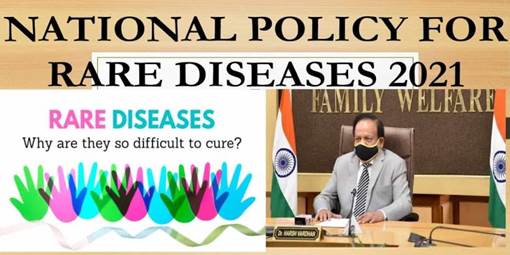Description

Disclaimer: Copyright infringement not intended.
Context
- Eight Centres of Excellence (CoEs) have been identified for diagnosis, prevention and treatment under National Policy for Rare Diseases 2021.
What is Rare disease?
- Lifelong disease or disorder condition with a prevalence of 1 or less, per 1000 population is defined by the World Health Organization (WHO) as a rare disease.
- Some examples of rare diseases include hemangiomas, Hirschsprung disease, Gaucher disease etc.
Rare Diseases Policy
- The Rare Diseases Policy aims to lower the high cost of treatment for rare diseases with increased focus on indigenous research with the help of a National Consortium to be set up with Department of Health Research, Ministry of Health & Family Welfare as convenor.
- Increased focus of research and development and local production of medicines will lower the cost of treatment for rare diseases.
- The policy also envisage creation of a national hospital based registry of rare diseases so that adequate data is available for definition of rare diseases and for research and development related to rare diseases within the country.
- The Policy also focuses on early screening and prevention through primary and secondary health care infrastructure such as Health and Wellness Centres and District Early Intervention Centres (DEICs) and through counselling for the high-risk parents.
- Screening will also be supported by Nidan Kendras set up by Department of Biotechnology.
- Policy also aims to strengthen tertiary health care facilities for prevention and treatment of rare diseases through designating 8 health facilities as Centre of Excellence and these CoEs will also be provided one-time financial support of up to Rs 5 crores for upgradation of diagnostics facilities.
- A provision for financial support up to Rs. 50 lakhs under the Umbrella Scheme of Rastriya Arogya Nidhi is proposed for treatment, of those rare diseases that require a one-time treatment (diseases listed under Group 1 in the rare disease policy).
- Beneficiaries for such financial assistance would not be limited to BPL families, but the benefit will be extended to about 40% of the population, who are eligible under Pradhan Mantri Jan Arogya Yojana.
- Policy also envisages a crowd funding mechanism in which corporates and individuals will be encouraged to extend financial support through a robust IT platform for treatment of rare diseases.
- Funds so collected will be utilized by Centres of Excellence for treatment of all three categories of rare diseases as first charge and then the balance financial resources could also be used for research.

National Policy for Rare Diseases (NPRD), 2021
- The Government has launched National Policy for Rare Diseases (NPRD), 2021 in March, 2021 for the treatment of rare disease patients. The salient features of NPRD, 2021 are as under:
- The rare diseases have been identified and categorized into 3 groups namely Group 1, Group 2 and Group 3.
- Group 1: Disorders amenable to one-time curative treatment.
- Group-2: Diseases requiring long term/lifelong treatment having relatively lower cost of treatment and benefit has been documented in literature and annual or more frequent surveillance is required.
- Group 3: Diseases for which definitive treatment is available but challenges are to make optimal patient selection for benefit, very high cost and lifelong therapy.
- Provision for financial support of up to Rs. 50 lakhs to the patients suffering from any category of the Rare Diseases and for treatment in any of the Centre of Excellence (CoE) mentioned in NPRD-2021, outside the Umbrella Scheme of Rashtriya Arogaya Nidhi.
- In order to receive financial assistance for treatment of rare disease, the patient of the nearby area may approach the nearest Centre of Excellence to get him assessed and avail the benefits.
- Eight (08) Centres of Excellence (CoEs) have been identified for diagnosis, prevention and treatment of rare diseases.
- Five Nidan Kendras have been set up for genetic testing and counselling services.
https://www.pib.gov.in/PressReleasePage.aspx?PRID=1846230
1.png)
















